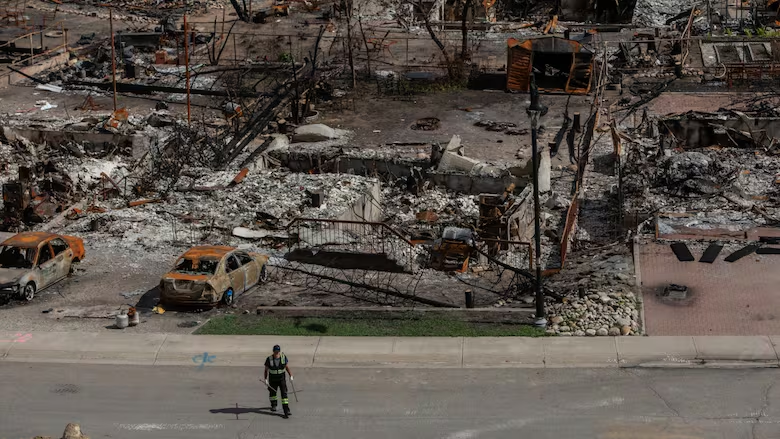Residents of fire-ravaged Jasper enter new year with hope, anxiety
Months since the disaster, residents are rebuilding what was lost

This year, Kim Stark's kids took responsibility for decorating the family Christmas tree.
Ornaments include toy cars, puzzle pieces, string and a pair of binoculars — things her three young daughters had handy after the family lost their home in summer's devastating wildfire in Jasper, Alta.
"I have the most wonderful tree on the planet," Stark said. "It's part of our story and part of who we are.
"If [the kids] are happy, I'm happy."
Stark is part of the fabric of the Jasper townsite, a 10-year member of the fire department and owner of a coffee shop and bakery.
Her family, plus three furry pets and a fish, are living in a condo as they navigate rebuilding their home.
"[The kids] miss our house, and we talk about our house," Stark said.
"We make sure we go to our neighbourhood, so that it doesn't become somebody else's neighbourhood."
Stark and other residents are anxious and nervous for the future following the fire that hit the town July 24.
About 5,000 residents and 20,000 visitors were safely evacuated before the fire breached the western edge of town and destroyed 350 homes and businesses, including 820 housings units. The Insurance Bureau of Canada pegged the damage at $880 million.
Six months after the fire, debris is still being cleared — lot by lot.
Locals including Stark are quick to say things could have been worse.
But anxiety over temporary living situations and what may be a long and slow rebuild process has many residents and municipal leaders feeling unsettled heading into 2025.
For Sabrina Charlebois and David Leoni, the top concern is the Alberta government's $112-million modular housing project. It's to put up 250 pre-built rental units in the town and rent them to those displaced by the fire.
Social Services Minister Jason Nixon said the first homes should be ready by late January or early February, with the rest in April. The majority are to be multi-bedroom suites to accommodate families.
"If we can get all of our approvals on time, we definitely are on time to be able to build in the context of what we promised," Nixon said.
It's complicated, he added, given there are layers of government with an Alberta town in a national park.
Charlebois was born and raised in Jasper. The fire destroyed her childhood home, which her late father built, as well as the salon where she worked.
"It's better than nothing," she said of the housing project, noting at least 2,000 residents were displaced so demand could outnumber the new units.
Charlebois, who has been staying in a hotel, said it's understandable projects like this take time. But "we're six months into this, and there's no homes for anyone."
"My fear is not finding a place to live, because I have to be out of my hotel by the spring," she said.
Leoni, a dentist and former Olympic biathlete, and his family also lost their home, as did seven staff at his clinic. He said the April cutoff date Charlebois is facing also applies to his staff staying in hotels.
"Hopefully that's concurrent with the provincial government's opening of these modular units that they're putting in, because we're going to lose staff," Leoni said.
"Without them I can't do anything."
The clinic needed to replace $160,000 worth of equipment and required a top-to-bottom scrub before appointments resumed in October.
Leoni estimates his patient list is down one-third because of the fire. Whether those patients return remains to be seen.
A catch-22
Charlebois and Leoni both said their anxiety is heightened when they consider the unpredictable nature of the town's tourism economy and how it could complicate the pace of rebuilding.
It's a catch-22: residents need houses in order to rebuild and restart the economy, but they can't restart the economy without tourists. And tourists require services, which require workers, who require housing.
Bill Given, the town's chief administrator, said he's optimistic the municipality can "thread the needle."
But he has his own anxieties when it comes to rebuilding, namely the complexity of Jasper operating under both federal and provincial oversight.
"An associated risk of that is that individual agendas from different orders of government overtake the public interest in delivering on what Jasper needs," Given said.
"I think there's also a risk, maybe somewhat smaller, that private interests overtake the broader public interest."
'Failure is not an option'
Jasper Mayor Richard Ireland, who lost his home in the fire, said they have to find a way.
"Failure is not an option for anybody," Ireland said. "We have one chance to get this right, and that's what we have to do."
In the meantime, Stark and her daughters watch from behind a fence as what's left of their home is cleared away.
"I'm super excited just to have a hole instead of a burnt spiral staircase that was coming up in my backyard.
"Now," she said, "it's just this beautiful dirt.
"There's future there."


